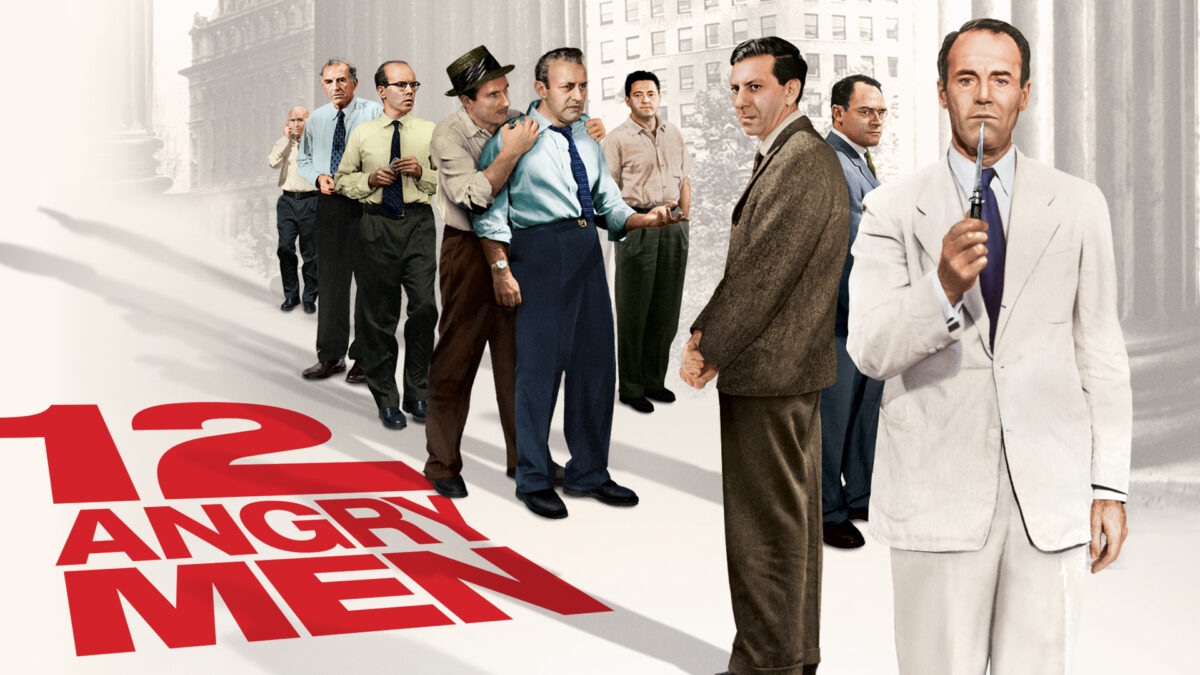“12 Angry Men,” directed by Sidney Lumet and released in 1957, stands as a timeless masterpiece of cinema, renowned for its gripping narrative, compelling performances, and profound exploration of justice, morality, and human nature. Adapted from Reginald Rose’s teleplay of the same name, the film unfolds almost entirely within the confines of a jury room, where twelve jurors deliberate the fate of a young man accused of murder. As tensions rise and prejudices surface, the jurors must confront their biases, assumptions, and personal demons in a quest for truth and justice.
Plot Summary:
The film opens with a jury of twelve men retiring to a deliberation room to decide the verdict in a murder trial. Initially, the mood is one of certainty, with all but one juror, Juror #8 (played by Henry Fonda), convinced of the defendant’s guilt. However, as Juror #8 raises doubts and presents alternative interpretations of the evidence, the jurors are forced to reexamine their preconceptions and confront the flaws in the prosecution’s case.
Themes and Analysis:
At its core, “12 Angry Men” is a gripping courtroom drama that delves deep into the complexities of the human psyche and the flaws of the justice system. Through the interactions and conflicts among the jurors, the film explores themes such as:
- Prejudice and Bias: Each juror brings their own biases, experiences, and prejudices to the deliberation table, highlighting the subjective nature of judgment and the impact of personal beliefs on decision-making.
- Reason vs. Emotion: The clash between logic and emotion serves as a central conflict in the film, as jurors grapple with the weight of their responsibilities and the consequences of their verdict on the accused.
- Power Dynamics: “12 Angry Men” also examines power dynamics within the jury room, as Juror #8 challenges the authority of the foreman and empowers his fellow jurors to question their assumptions and seek the truth.
- Justice and Morality: As the deliberations unfold, the film raises profound questions about the nature of justice, the integrity of the legal system, and the moral obligation of individuals to uphold truth and fairness.
Performances and Direction:
One of the film’s greatest strengths lies in its ensemble cast, comprised of veteran actors who deliver powerhouse performances that captivate and compel viewers from start to finish. Henry Fonda shines as the steadfast Juror #8, whose unwavering commitment to justice inspires his fellow jurors to reexamine their convictions. Meanwhile, Lee J. Cobb delivers a memorable portrayal of Juror #3, whose personal biases and unresolved conflicts fuel his antagonism towards Juror #8.
Director Sidney Lumet’s masterful direction elevates the film beyond its courtroom setting, utilizing subtle camerawork, dynamic compositions, and nuanced performances to build tension and suspense throughout the deliberation process. Lumet’s decision to shoot the film in black and white further enhances its dramatic impact, immersing viewers in the claustrophobic atmosphere of the jury room and amplifying the emotional intensity of the characters’ interactions.
Legacy and Impact:
“12 Angry Men” has left an indelible mark on cinematic history, inspiring countless adaptations, homages, and parodies across various media. Its enduring relevance and universal themes continue to resonate with audiences around the world, making it a timeless classic that transcends cultural and generational boundaries.
Conclusion:
In conclusion, “12 Angry Men” (1957) stands as a cinematic tour de force that remains as powerful and relevant today as it was upon its release. With its taut script, stellar performances, and incisive exploration of justice and human nature, the film captivates audiences with its gripping narrative and thought-provoking themes. As jurors grapple with the weight of their decisions and confront the biases that shape their perceptions, “12 Angry Men” reminds us of the importance of empathy, integrity, and the pursuit of truth in the face of adversity. Truly, it is a film that demands to be seen and celebrated for generations to come.
